Why employ software testing consultants vs in-house experts in Finland
17.04.2023

There are a variety of ways to approach software testing, such as doing it yourself, hiring a software testing consultant, or combining the two approaches.
In this article, we will explore the pros and cons of using testing consultants and compare them to using your own employees, to determine which is best for your project.
Many companies, like VALA for example, offer various turnkey projects and even take care of the quality of a product as a whole (see our MTV reference here). But for the sake of simplicity, this article focuses only on situations of hiring individual consultants.
Pros of Working with a Software Testing Consultant
Experience
Software testing consultants typically have a great deal of experience and expertise in their field, which can help ensure that your software development projects are completed on time and within budget. Consultants are often seniors and as importantly, have often seen multiple different projects and environments. With their experience they can also provide valuable guidance and advice to help you create comprehensive and effective testing strategies and plans. Moreover, testing consultants often have a strong drive to show their worth and knowledge by helping the customer.
Scaling up and down quickly
One of the most obvious benefits of using testing consultants is the possibility to scale your team up and down quickly. Especially in Finland, making changes to the strength of your team is slow and difficult. Even if it would be legally possible to let some people go, it definitely isn’t good for your employer brand making future recruits even more difficult. With consultants, you don’t have this issue and more importantly, you don’t have to treat people poorly in order to make changes, it’s business as usual in consulting. And when you need to scale up, it is usually a lot quicker with using external consultants.
One more thing worth mentioning is that when you use external help, you can patiently give time and room for your own organization and experts to grow, without jeopardizing your business growth and goals. Moreover, if you realize that you have capacity issues, you are already late and working with partial capacity eats up morale and accumulates the strain on employees.
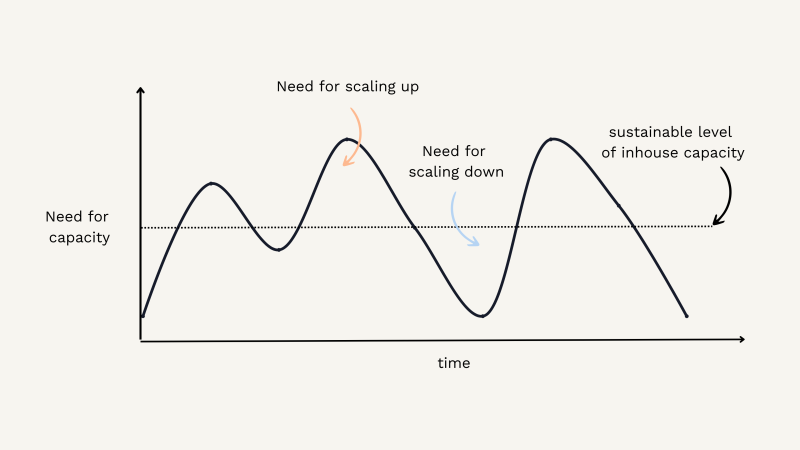
Speed, compared to the time consuming (and expensive) recruiting
As said, recruiting your own software testing professionals is a slow process. With all the interviews and coding tests etc. the hiring process usually takes more or less a month. And only after the decision is made, can the new employee give their resignation in their current job, and after that there is usually approximately a month’s notice time. So the total time at best, is about two months from the first interview to the first day at the new job.
More often than not, companies are not too proactive with new hires, making the initial waiting time expensive as the planned work doesn’t progress. Moreover, recruiting itself takes a lot of time from the recruiting team, which naturally is not free.
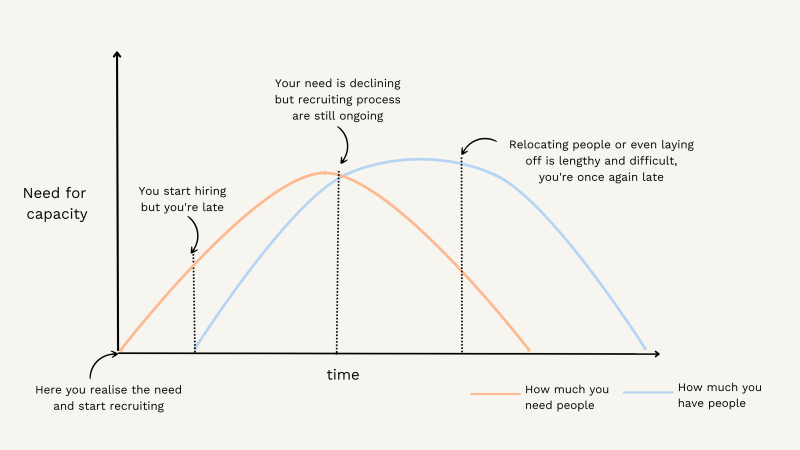
Finally, in order to get applications from talented software testing professionals, you need either job ads or you need to do headhunting yourself, both expensive functions. As a reference, using an external recruiting company to hire you a software testing professional, costs anything from 5 000 to 12 000 euros.
If you have good partnerships with large enough testing consultancy companies, it’s possible to get a new expert working in a matter of days. That’s quite a head start both financially and time wise.
Using consultants is way less risky than hiring employees
Once again when we are comparing consultancy and recruiting, it is recruiting’s con that turns to a consultancy’s pro.
People make mistakes and especially in recruiting, it is actually quite likely to make mistakes. This is not because recruiters are bad but simply because meeting someone one to three times is simply not enough to get to know the person well enough. Because of this there is always a relatively significant chance that the person is not a good fit for the team or for the company.
With coding tests and technical interviews you can get a pretty good picture of the technical skills of the applicant but it is very difficult to find out the true working ethic and ways of working, and if these are not what you thought they would be, you have made a mistake with the recruit.
Hiring the wrong person – in terms of cultural fit, technical skills or working ethic for example – is highly risky for the aforementioned reasons related to scaling your team.
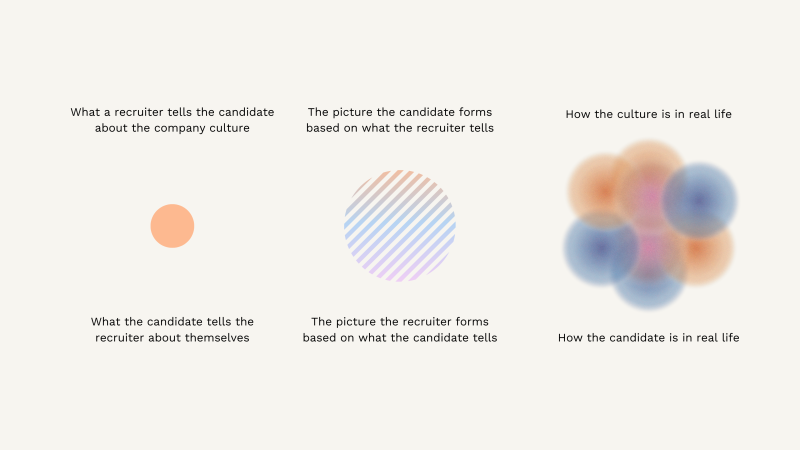
In consultancy, there’s usually approximately one month’s notice in the contracts and basically the customer can terminate the contract quite easily. So if the consultant is not delivering, it’s a lot easier to replace them compared to an employee.
One more point worth mentioning is that the expectations towards a workplace can sometimes be more realistic with consultants. Consultants are prepped for the projects very honestly (at least at VALA) in terms of what the work will be like; and unlike employees, consultants are not subject to the (sometimes quite flattering) job ads used to lure employees.
Expert from a consulting company can exploit the knowledge of the whole company
When hiring a consultant from a consultancy company, you indirectly get to benefit from a vast amount of knowledge and experience that the company as a whole possesses.
For example, if a difficult situation arises, the consultant usually has their own networks in place in their consultancy company where they can ask for help. At VALA for example, based on their specialty (QA, Test automation and SW Development), everyone is part of a VALA community where they can ask for help for the trickiest of problems.
Moreover, when working with a consultancy company, you get to take advantage of the company’s – many times quite extensive – general knowledge relating to your project(s). For example, at VALA we have 15 years of experience from various industries, and technical- and business environments. With this experience, we can quite often provide added value to our customers beyond the expertise of our individual consultant(s).
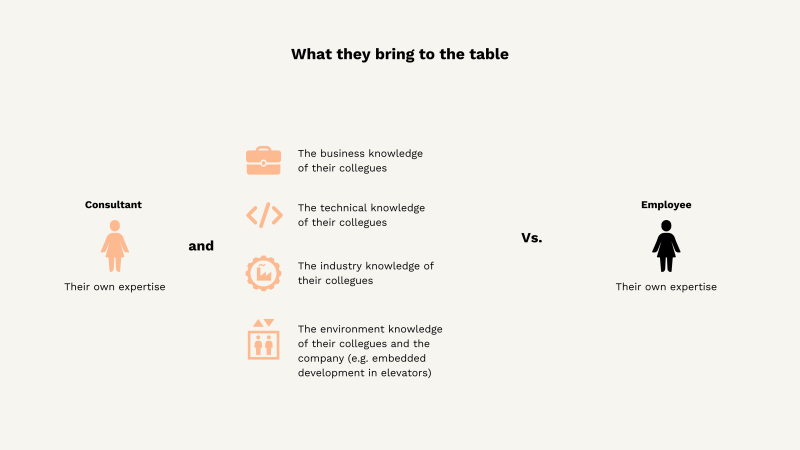
One important benefit consultancy companies can offer is help with building senior + junior combinations. Everyone wants to hire seniors who already know how to do the work. However, this is extremely difficult and in the end, not always needed. One can just as well hire a junior who is trained by a senior consultant, and when the junior is “ready”, one can let go of the senior consultant.
Cons of Working with a Software Testing Consultant
Price
Working with a software testing consultant has its drawbacks. One of the major issues is cost. Fees charged by software testing consultants are naturally higher than the salaries paid to employees (other salary related expenses tighten the gap but won’t close it).
Although, one should also consider the direct and indirect costs that one avoids by using consultants like: sick leaves, benefits, insurances, recreational costs, educational costs, personal vacations and vacation day compensations.
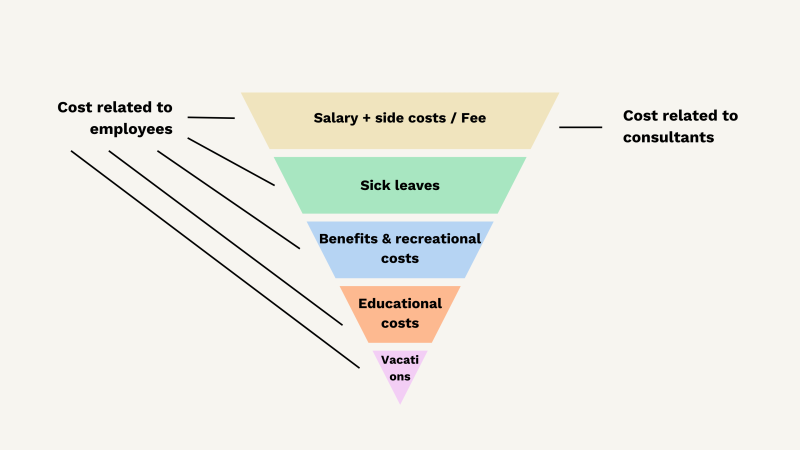
Substance knowledge
Even though software testing consultants are usually matured professionals, they may lack the same level of substance knowledge your own employees possess. Of course the situation is the same with new hired employees but one might argue that employees are usually hired for a longer term in mind and thus will eventually handle the substance better than consultants.
Moreover, people who are mentally more tied to the organization (i.e. employees), might also have more motivation to acquire deep knowledge of your operating environment. Emphasis on might, because at VALA we haven’t noticed this, maybe because consultants have high motivation to learn and learn fast, due to the fast moving nature of consultancy.
Commitment
As said, consultancy is fast moving by nature. Naturally there are exceptions, but in general a consultancy project is significantly shorter than a typical employment term. Because of this nature, employees tend to take a better grasp of your culture and values etc. over time. In general, consultants may not have the same commitment to the organization as permanent team members.
However, nowadays employment terms are often short too and changing jobs every two years or so is not that uncommon. At the same time it’s common for consultancy projects to last several years. So, maybe the level of commitment is more a mental matter than a matter of length or contract type.
Finding the Right Software Testing Consultant
If you’ve decided to use software testing consultant(s), there’s a few important factors that you should consider.
First, you should determine what kind of expertise you really need. Some consultants focus on automation testing, while others specialize in exploratory testing; some lead teams and some can see the big picture and handle the whole entity of testing/quality. You should have a clear understanding of where your most critical needs are and what roles are suitable for consultants (or unsuitable for employees).
Second, different consultants offer different levels of expertise. You should critically evaluate what you really need and pay attention to the possible flip side of the coin. For example, you might be tempted to find a less experienced consultant or one with no experience from your field but this might eventually become more expensive considering the time needed to get the consultant to a 100% productive mode.
Additionally, you should consider the company offering the consultant(s). If the company is known for taking care of its employees, it probably attracts skilled and more motivated consultants, whereas companies who are less acknowledged for taking care of their employees, well, you see where we are going with this…
By evaluating these factors, it’s possible to find the right kind of mix of knowledge and experience, and at the right price point – without forgetting the cultural fit, we’re talking about people after all.
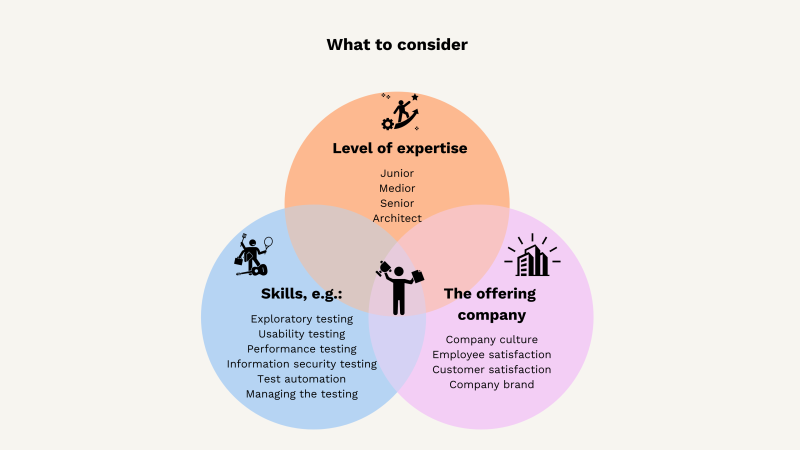
The Benefits of In-House Software Testing
In-house software testing offers a number of benefits that software testing consultants cannot provide.
Perhaps the most important perk is the accumulated inside knowledge your own employees have. They know your company culture and ways of working. They know your product(s) and their characteristics, strengths and weaknesses. Consultants can learn all this too but your employees have a substantial head start.
The other major strength we’d like to point out is that internal employees are more likely (than consultants) to be highly committed to your company. Many consultants are very committed to the companies they work for. Especially in the Finnish IT landscape the projects can last for years, making the client company feel like an employer to the consultant. But still, there’s no denying that it feels different to work in a certain company than to work for that company as a consultant. And that makes employees a tiny bit more committed, at least on average.
Conclusion
Ultimately, there is no one-size-fits-all approach when it comes to resourcing your software testing. Whether you use a consultant or an in-house team to test your software, you should take some time to consider the pros and cons associated with each option.
Software testing consultants offer benefits like high level of expertise and experience, speed of recruiting, possibility to scale up and down quickly and easily, the knowledge of the company behind the consultant and lower risks in the long run..
On the other hand, software consultants can be less cost efficient, and have less substance knowledge and commitment than employees.
According to our experience, the best results come from combining the best aspects of both. Moreover, we have rarely seen companies who have successfully managed to handle their development with only consultants or only in-house experts.
If you’ve come to the decision of using consultants, VALA offers arguably some of the best ones in Finland, and much more.
- Blog |
- Business |
- QA |
- Software testing



